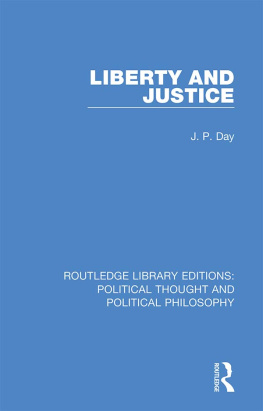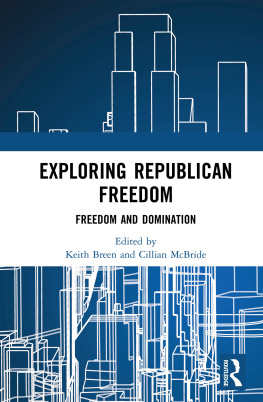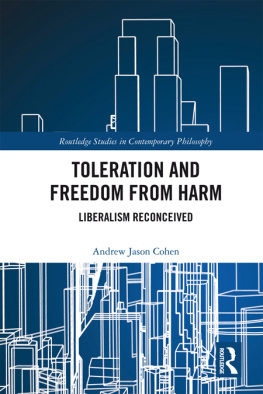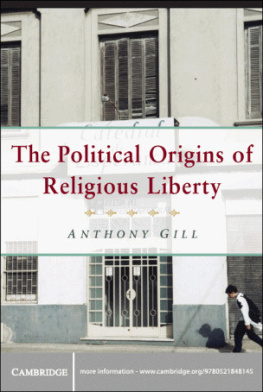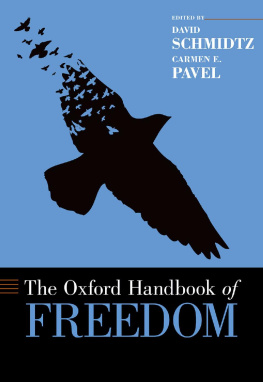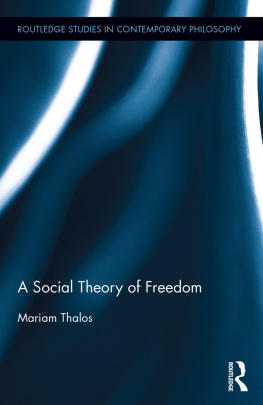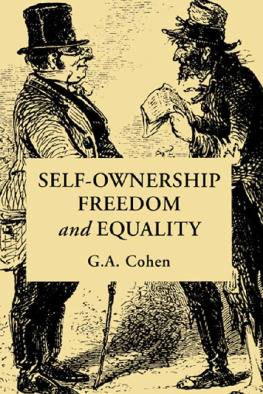THE FREE, THE UNFREE AND THE EXCLUDED
The Free, the Unfree and the Excluded
A treatise on the conditions of liberty
Phillip Cole
Centre for Practical Philosophy Middlesex University
First published 1998 by Ashgate Publishing
Reissued 2018 by Routledge
2 Park Square, Milton Park, Abingdon, Oxon OX14 4RN
52 Vanderbilt Avenue, New York, NY 10017
Routledge is an imprint of the Taylor & Francis Group, an informa business
Copyright Philip Cole 1998
All rights reserved. No part of this book may be reprinted or reproduced or utilised in any form or by any electronic, mechanical, or other means, now known or hereafter invented, including photocopying and recording, or in any information storage or retrieval system, without permission in writing from the publishers.
Notice:
Product or corporate names may be trademarks or registered trademarks, and are used only for identification and explanation without intent to infringe.
Publisher's Note
The publisher has gone to great lengths to ensure the quality of this reprint but points out that some imperfections in the original copies may be apparent.
Disclaimer
The publisher has made every effort to trace copyright holders and welcomes correspondence from those they have been unable to contact.
A Library of Congress record exists under LC control number: 98071968
ISBN 13: 978-1-138-34231-6 (hbk)
ISBN 13: 978-0-429-43981-0 (ebk)
This book began life as a PhD thesis, awarded by the University of Keele, and thanks is due to Dr Brian Smart who supervised that process. Parts of it have also been tested in classes and research seminars at various institutions, and so thanks are due to colleagues and students at Staffordshire University and Middlesex University for their critical and supportive feedback over the years. Finally, thanks to Dr Roshi Naidoo, who lived through both stages of its life with the utmost patience, and whose own work and intellect have set me standards and principles I can only hope this work can live up to.
Some sections of the book have been adapted from previously published essays. draws on "Liberalism and Welfare: the Limits of Compensation", Liberalism and the New Europe, eds. B. Brecher and O. Fleischmann (Avebury, Aldershot, 1993).
This book develops a particular theory of freedom, and explores the relationships between this view of freedom and issues of social justice. Often, the idea of freedom has a negative role to play in relation to the idea of social justice its function is to limit the scope of social justice, to set boundaries around programmes of social justice in order to preserve 'individual liberty'. This is usually stated in terms of a conflict between state authority and individual liberty, such that state action is often, if not always, a threat to that liberty: and as programmes of social justice are most often state-provided, such programmes themselves encroach upon the sphere of freedom. Undoubtedly, the idea of freedom does have a legitimately negative role to play here, but the claim explored in this book is that it also has a positive role to play which is prima facie equally important. Rather than simply acting as a negative side-constraint upon programmes of social justice, freedom is also a positive goal that programmes of social justice must pursue. Therefore the idea of freedom contributes substantial content to the theory of social justice, rather than simply drawing boundaries around it.
There is a specific family of issues of social justice which, it is claimed, can be best understood as problems of freedom. These issues can be characterized as a particular form of deprivation, best understood as exclusion, where particular groups are excluded from full participation within society's institutions and practices. The claim is that full participation is constitutive of freedom, and that therefore exclusion from participation is a violation of freedom. Seeing these issues of exclusion as problems of freedom leads to a distinctive approach to how they should be understood within the context of social justice, and a distinctive view of what social justice demands in these cases. Therefore the book examines the relationship between freedom and social justice both in theory and practice, and the way in which that relationship has been specified in liberal theories. The practical problem being addressed is the exclusion of certain groups from particular institutions and practices, and the strategies of social justice which can best tackle this form of deprivation.
The theory of freedom developed is impure. It is argued that freedom has positive as well as negative aspects and conditions that people require both the space and power to be free; one without the other is insufficient as a guarantee of liberty. Neither the space nor the power needed for liberty can be preserved in a purely negative way. Freedom can only be ensured by taking positive steps. Without such a framework of empowerment, any space preserved by the purely negative framework not merely remains empty, it collapses in upon itself. It must therefore be part of any programme of social justice to create, preserve and protect the positive conditions of freedom.
The theory of freedom is radically impure in that while freedom requires both negative and positive conditions, and requires some balance between the two, no single such balance that will be right for all people under all circumstances is identified. People differ, and the conditions they require for freedom differ. There can be no apriori priority laid down for either aspect of liberty, positive or negative: this priority cannot be decided at the level of theory, only at the level of practice. This impure theory contrasts with purer negative or positive theories in this respect. These purer theories do not simplistically identify only positive or only negative aspects or conditions of freedom most theories of liberty do identify both sorts of condition as important. However, they do proclaim the priority of one kind of condition over the other, such that when there is a clash between the two, it is allegedly theoretically transparent which ought to prevail. Another consequence of such priority is that the absence of the secondary type of condition does not constitute a violation of freedom. In contrast, the impure theory of freedom claims that, where there is a clash, which kind of condition ought to prevail can only be decided in the particular circumstances of the situation, not at the abstract level of theory; and that the absence of either type of condition can constitute a violation of liberty. As a consequence, the impure theory describes a distinctive relationship between freedom and ability, a relationship which is both simpler and more politically satisfying than that relationship as described in purer theories.
A distinction has been made between the negative and positive aspects and conditions of freedom. By the negative and positive aspects of liberty it is to be understood that the free person (1) is not prevented from doing x (negative; non-interference), and (2) is able to do x (positive; power) they must have both the space and the power to act. By the negative and positive conditions of liberty is meant those conditions which must be in place if the negative and positive aspects are to be guarantied: these conditions are negative and positive in the sense that some such conditions are characterized by an absence of certain factors, while other such conditions are characterized by the presence of certain factors. What the impure theory crucially recognizes is that both negative and positive conditions each contribute to both the negative and positive aspects of liberty; and that the undermining of either negative or positive conditions of freedom can destroy both the negative and positive aspects.



